by Mike Royden
.
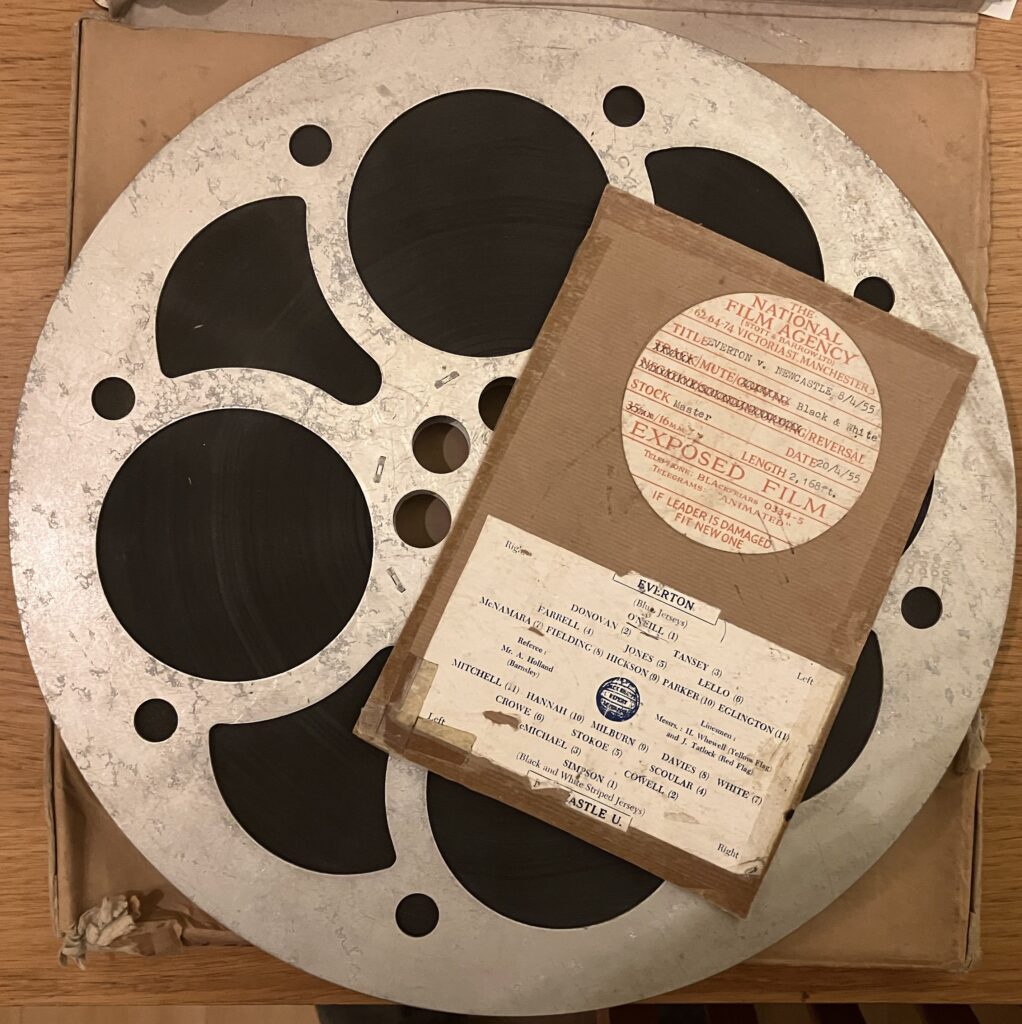
In this age of multimedia, with every archive film clip seemingly now available online, it is rare that an undiscovered gem becomes available. Yet, that is what has come into the hands of Everton FC Heritage Society. In the form of a 16mm cine-reel, it is the filmed record of the First Division match between Everton and Newcastle United, played at Goodison Park on 8 April 1955. It is also especially valuable because it documents at length (one hour of footage survives) a match from the 1950s – a rarity in itself – and a major addition to the film archive of our historic Goodison Park stadium during its existence from 1892 to 2025.
The game, played on Good Friday, 8 April 1955, came towards the end of the 1954/55 season – the club’s first year back in the top-flight after a rare excursion to the Second Division. (One absentee was my father, a Blue, but otherwise engaged on his honeymoon, my parents having got married just six days earlier).
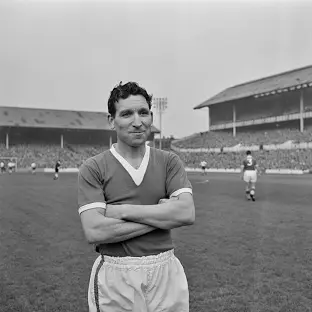
Before the game, Everton were lying seventh in the middle of a poor end-of-season run. After reaching third place on 23 March, the Blues could only muster one victory in the remaining ten games, finishing the season in eleventh place. Played in front of a crowd of 60,068, total football it wasn’t, but players showed remarkable skill trying to pass through a muddy surface, while often struggling to keep their balance. Liverpool-born George Hannah* put the visitors one-up on 17 minutes, with an equaliser coming five minutes later from Wally Fielding. Newcastle claimed the points with a 75th minute winner from Vic Keeble. (Match reports can be found at the end of the article).
Worse was to come in the Monday Bank Holiday away fixture on 11 April, which saw a 4-0 victory for the Magpies. (Back in the days when the Easter fixtures would feature the same opponents, home and away, on Good Friday and Easter Monday).
[*George Hannah was once on Everton’s books having signed for the Blues at fifteen. He was later selected for the Liverpool FA Youths’ eleven. This was still the days of National Service, and after he was posted to serve in Northern Ireland with the Army, Everton allowed him to play for Linfield in south Belfast. He later signed professional terms for them after he was demobbed].
The film was produced by Stott and Barrow, who had set up the The National Film Agency on Victoria Street, Manchester. Mr Stott, who had been making films since the days of silent movies, worked on commissions, as well as providing a developing service for professional film makers and in supplying equipment.
In early 1955, the Everton Board were looking into the possibility of filming full games to show them later. Test films were set up, and a projector was purchased. The initial purpose is likely to have been initiated by the manager, the films to be used internally as a review of the team’s performance in their previous games, before possibly opening them up to a wider audience.
Extracts from the Board’s Minutes under ‘Film Unit’;
Film Unit
A suggestion to purchase a Camera and projection apparatus at least of approximately five hundred pounds, for taking films at our matches met with general approval. It was agreed that a test film be made to cost in the region of Eighty pounds. Minutes of the Everton F.C. Board, Exchange Hotel, Tuesday 4 January 1955 (The Everton Collection, Liverpool R.O.)
It was reported that the Test Film made at our Match v Burnley* had been fairly good under difficult conditions and another showing on a larger screen would be arranged. Minutes of the Everton F.C. Board, Exchange Hotel, Tuesday 1 February 1955 (The Everton Collection, Liverpool R.O.) [*Everton v Burnley 1-1 (Fielding), 15 Jan 1955 Goodison Park]
It was noted that the test film taken at the Manchester City match** would be shown at the ground at 4.30 p.m. on Thursday. Minutes of the Everton F.C. Board, Exchange Hotel, Tuesday 1 March 1955 (The Everton Collection, Liverpool R.O.). [**Everton v Man City 1-0 (Hickson), 23 Feb 1955 Goodison Park]
It was reported that the cost of filming would be approximately £70 per match, and it was agreed that a projector be purchased for showing these films. Minutes of the Everton F.C. Board, Exchange Hotel, Tuesday 8 March 1955 (The Everton Collection, Liverpool R.O.)
Whether or not Walter Stott was commissioned to film the games is as yet unconfirmed, but his company does appear to have processed the film reel at least, although his involvement may have ended there.
What this does indicate, is that these games from 1955 were being filmed in full, and we hope to announce more about other possible surviving archive in the near future.
Programme Line Up
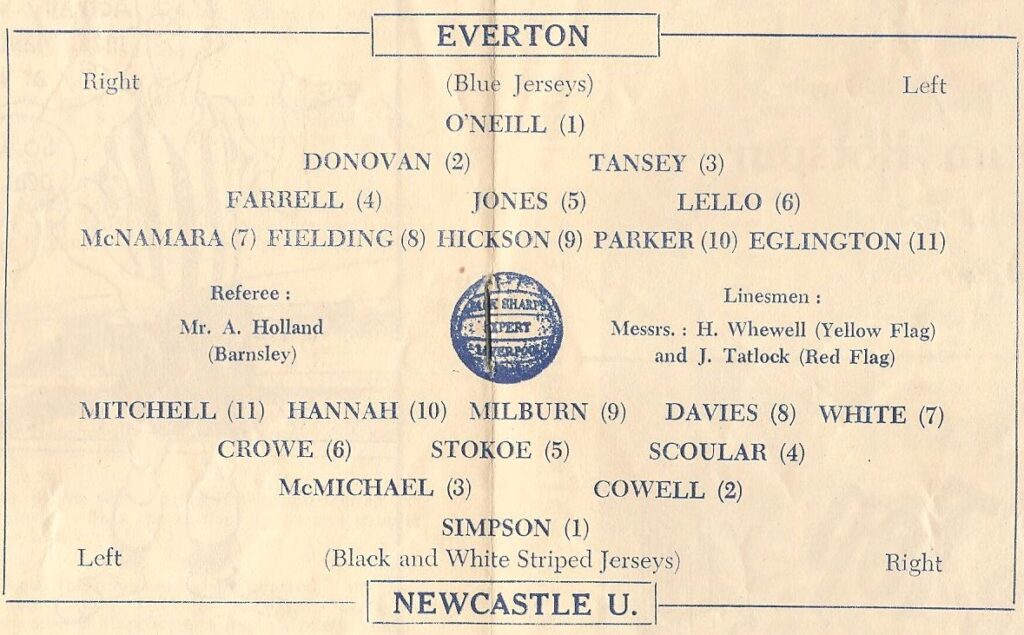
Actual Line-up
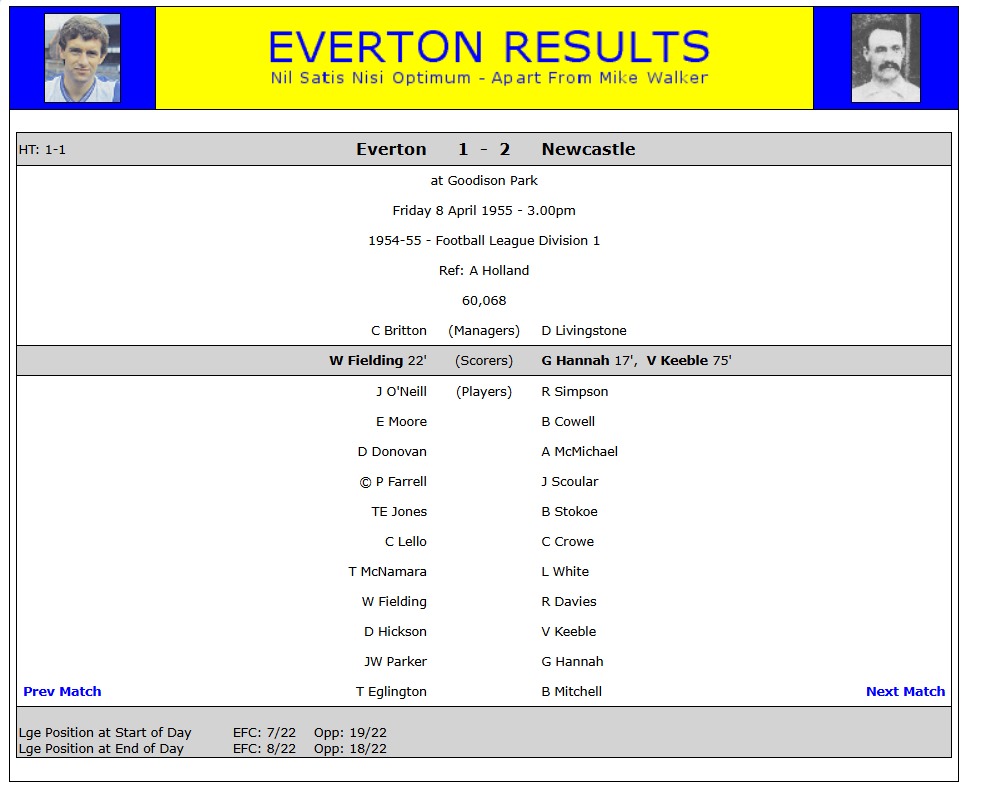
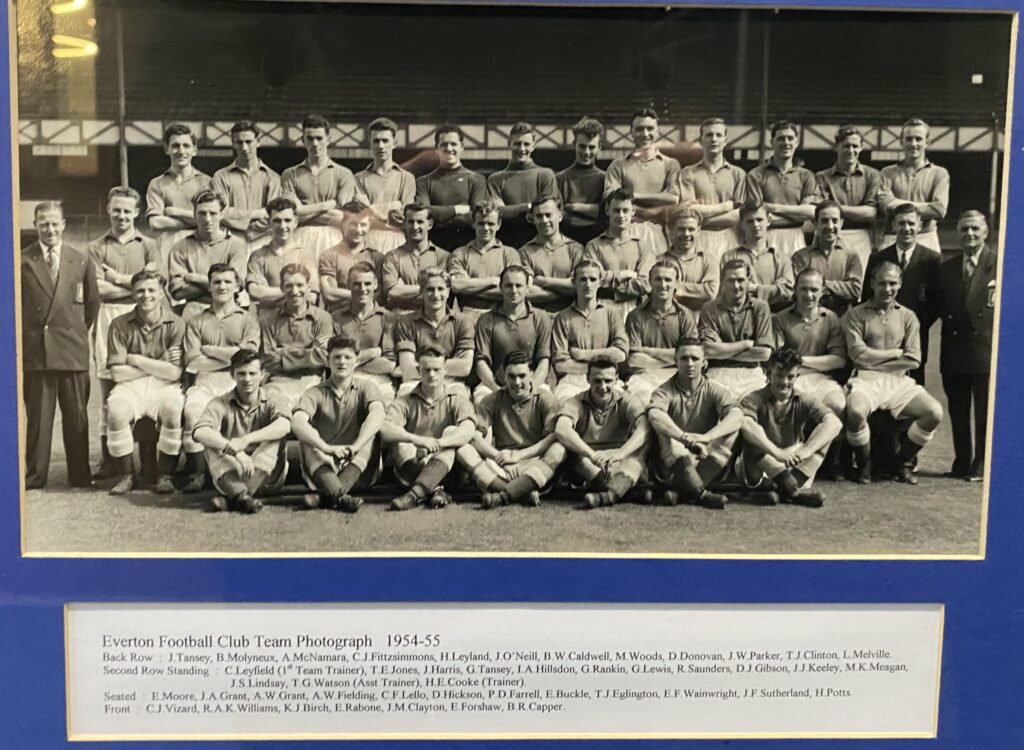
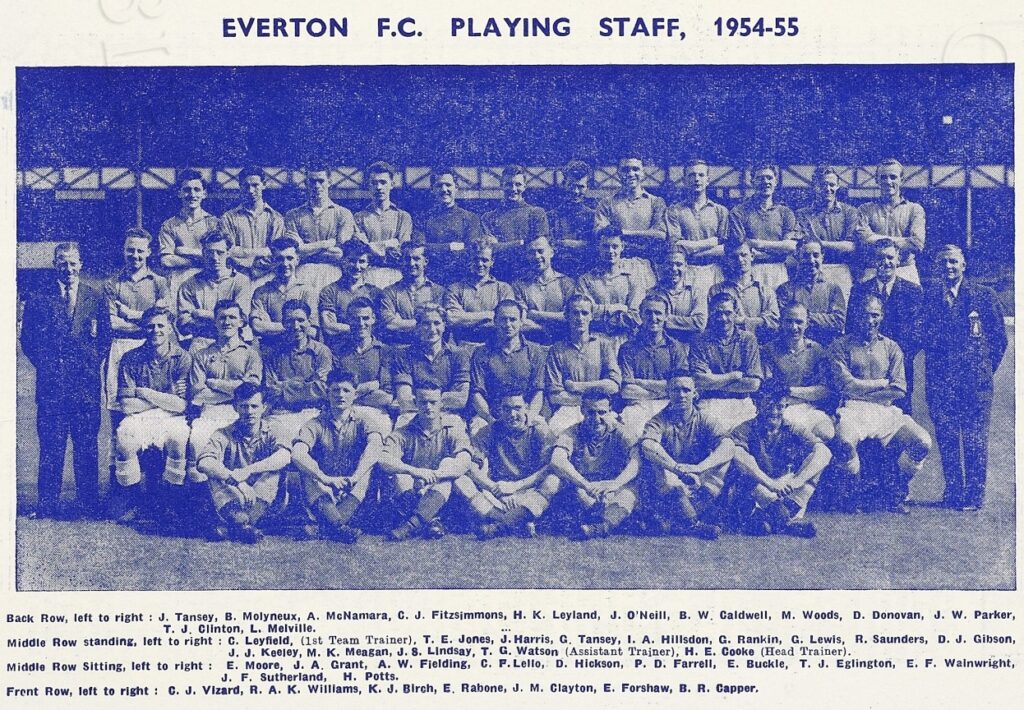
Match Day Programme
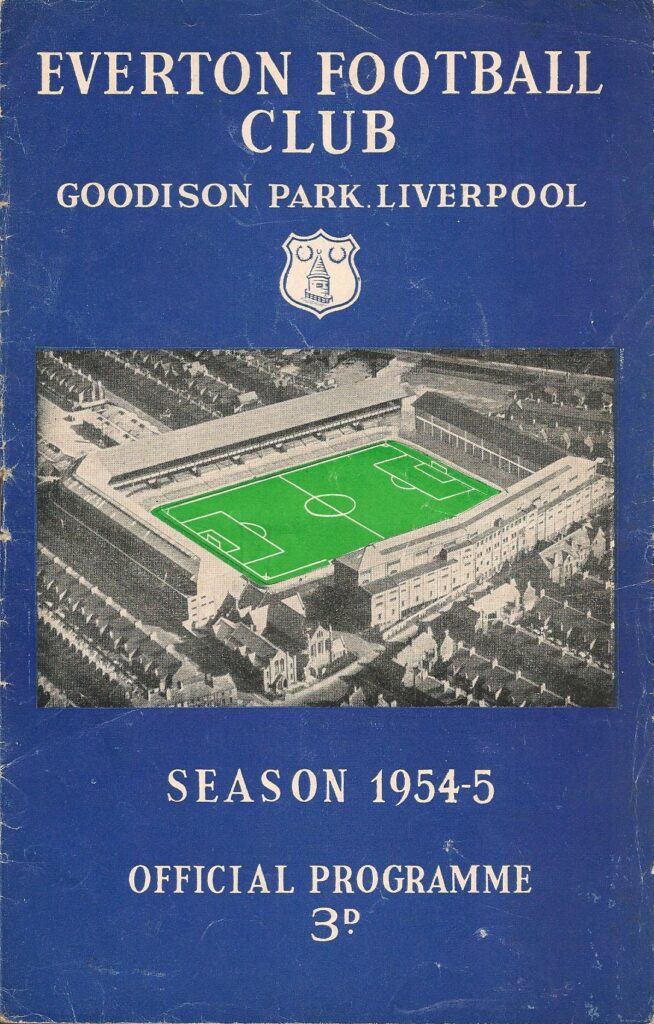
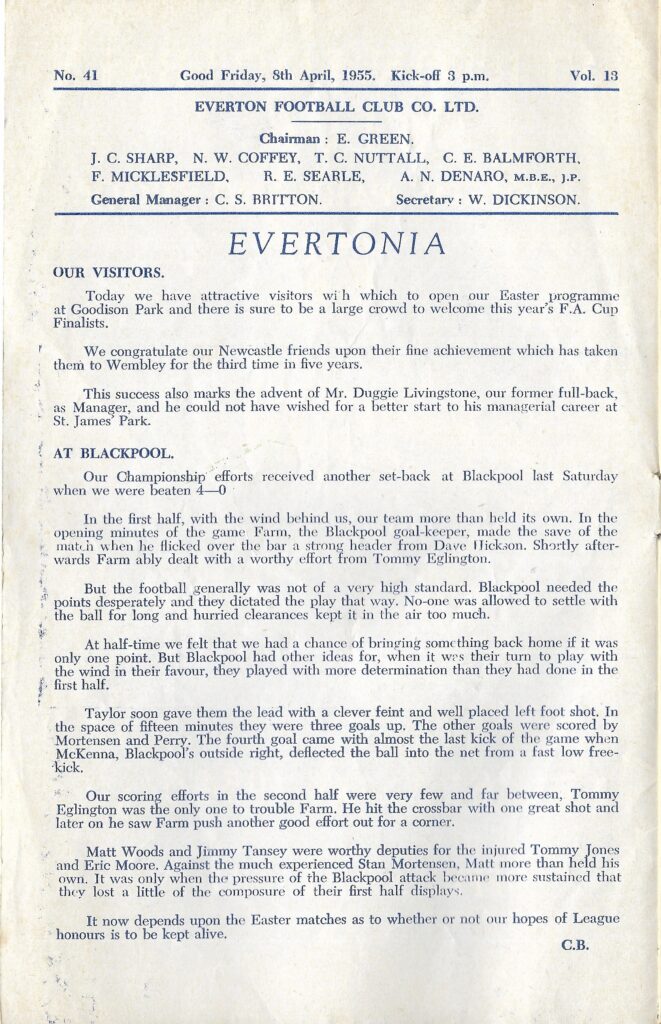
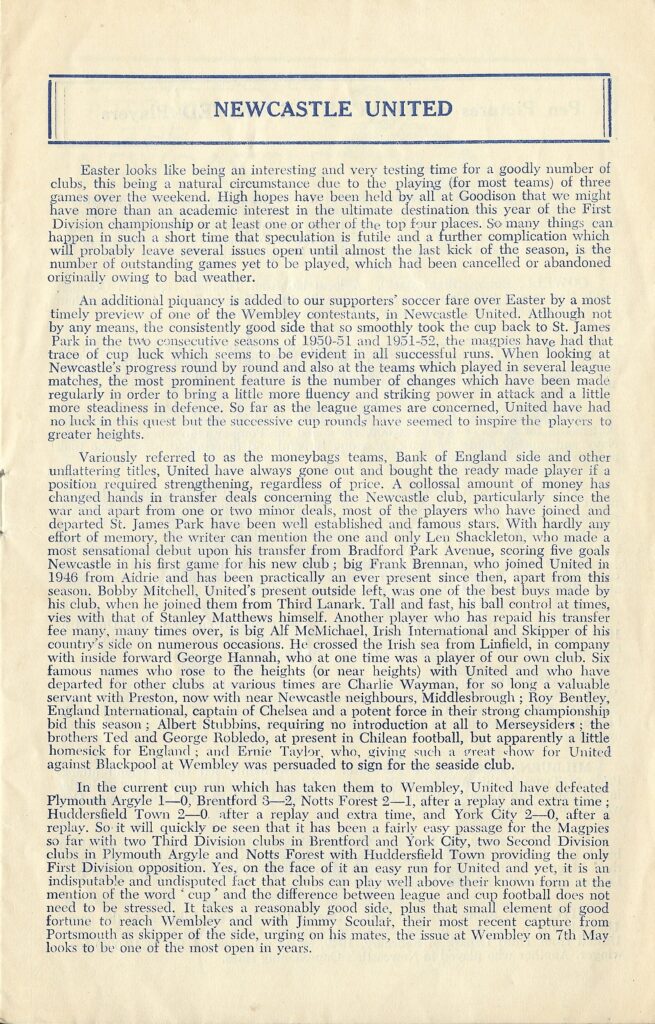
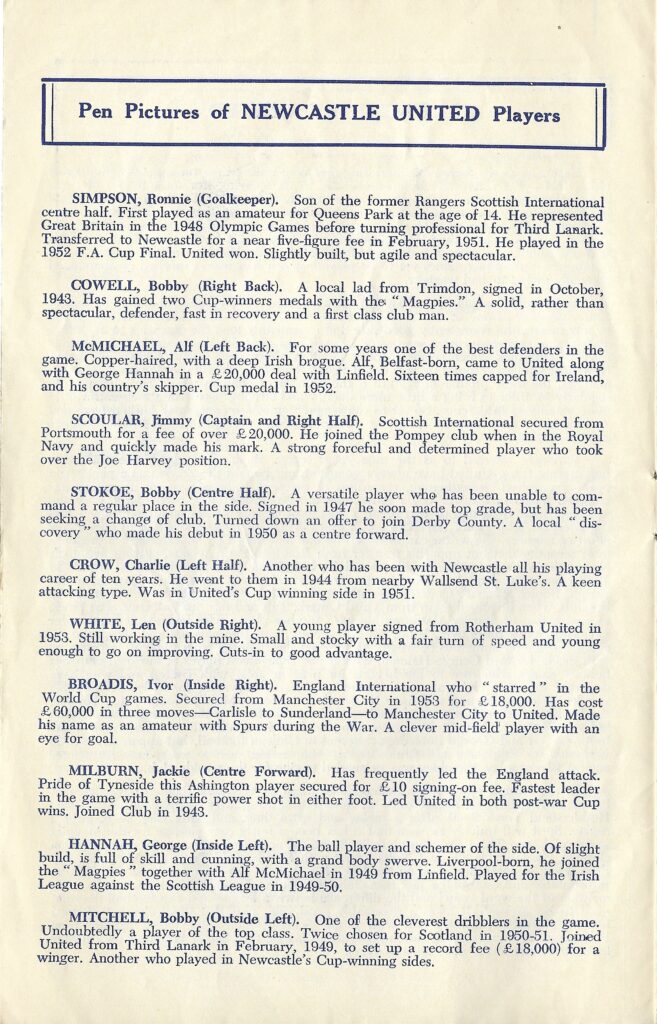
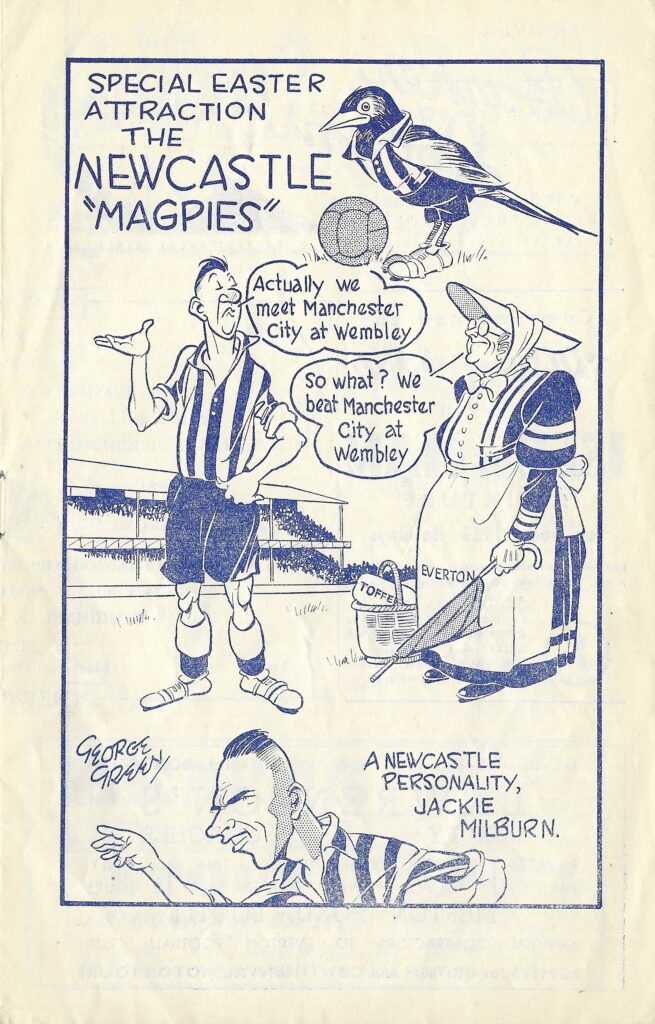
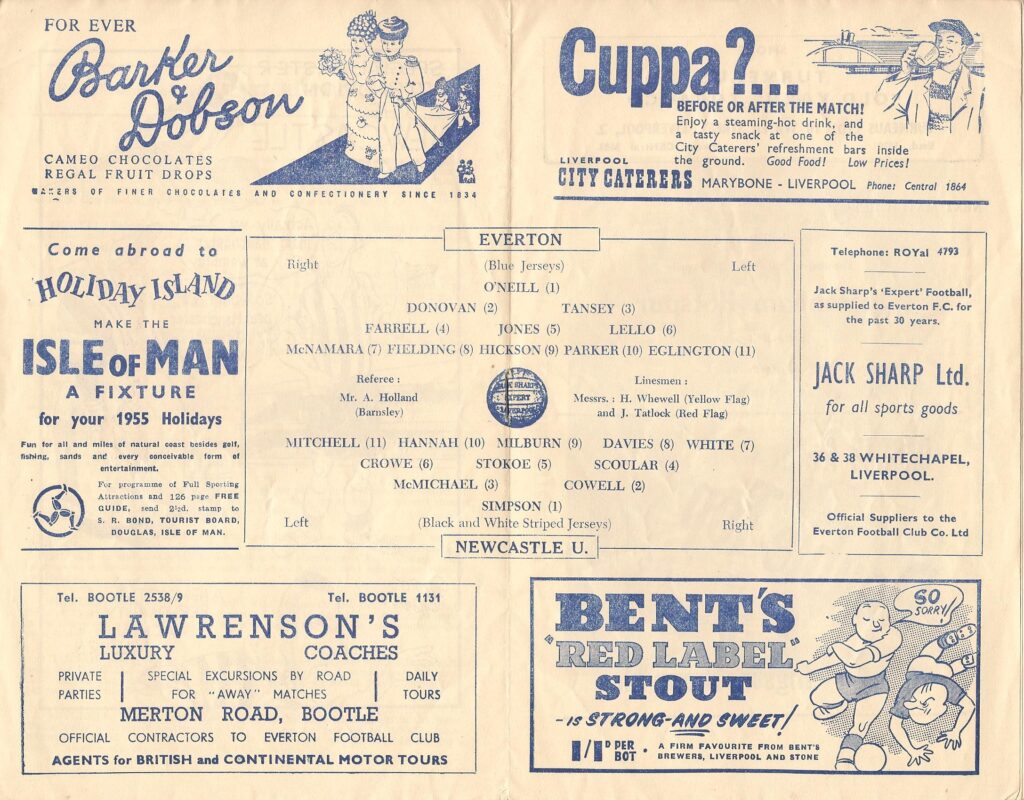
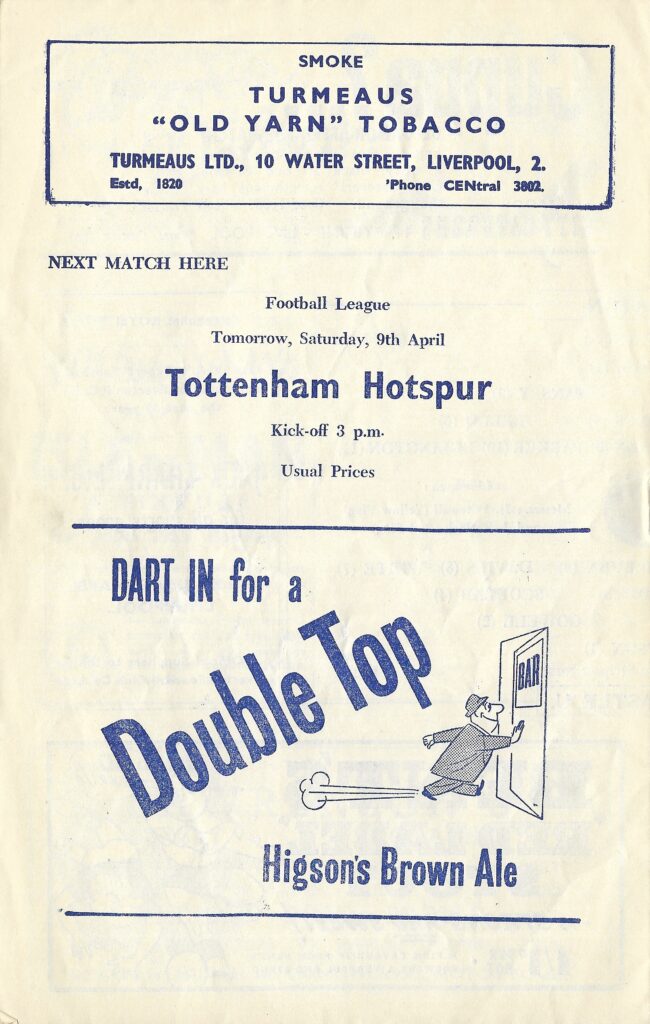

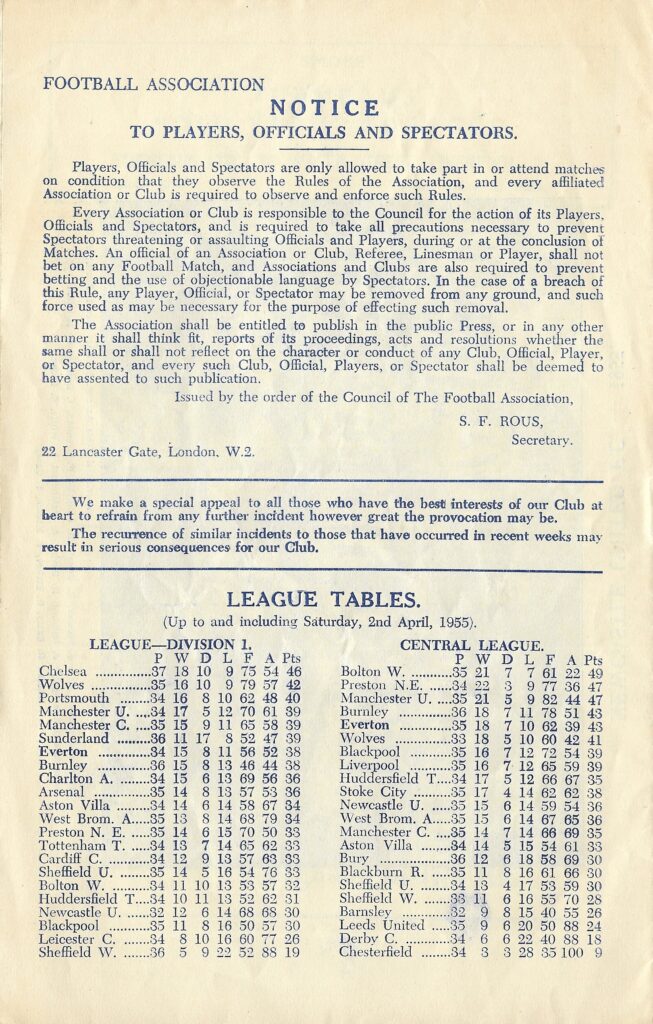
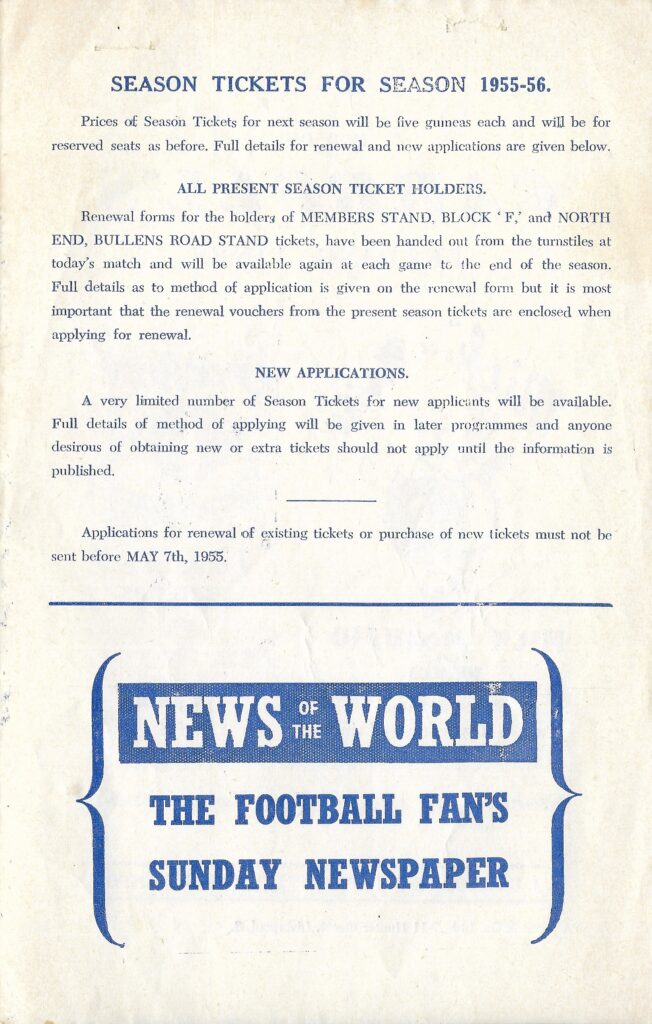
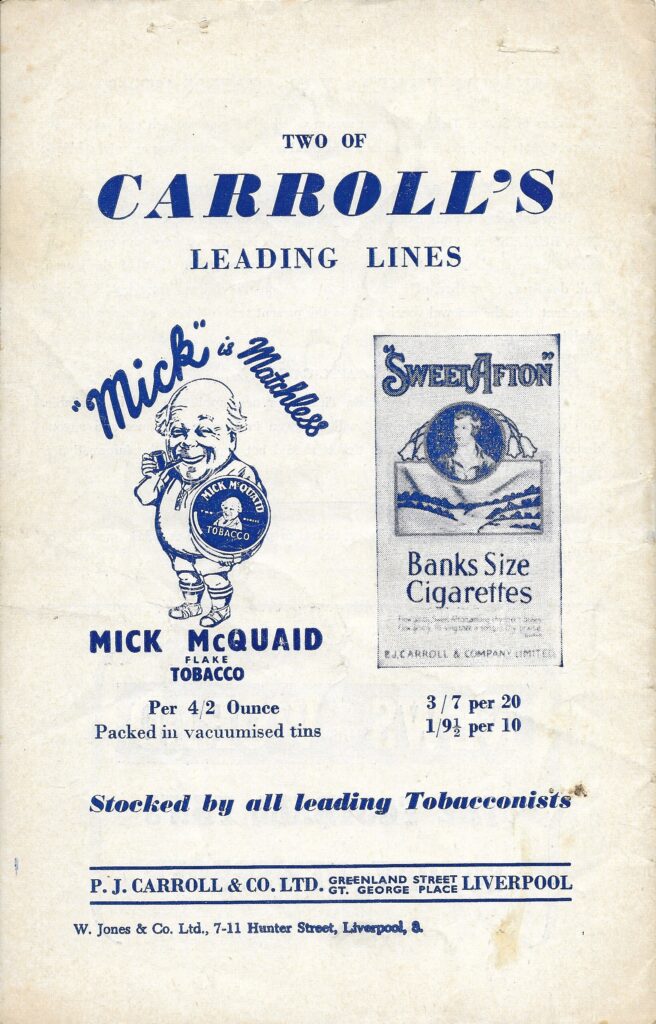
The Cine Film Package Stock Label
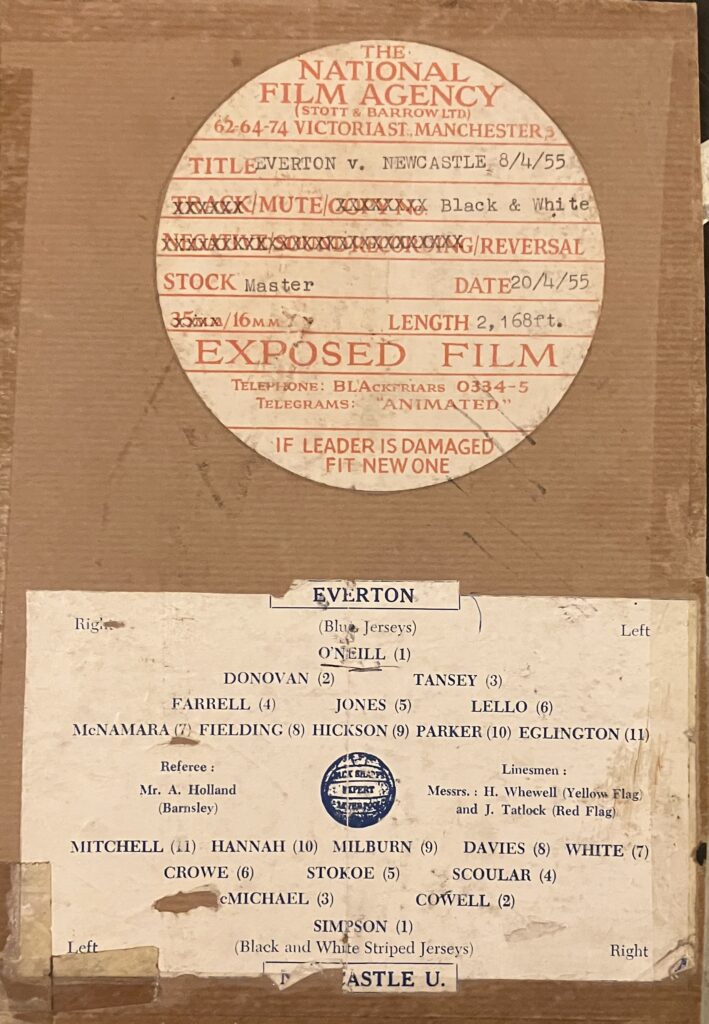
Match Reports

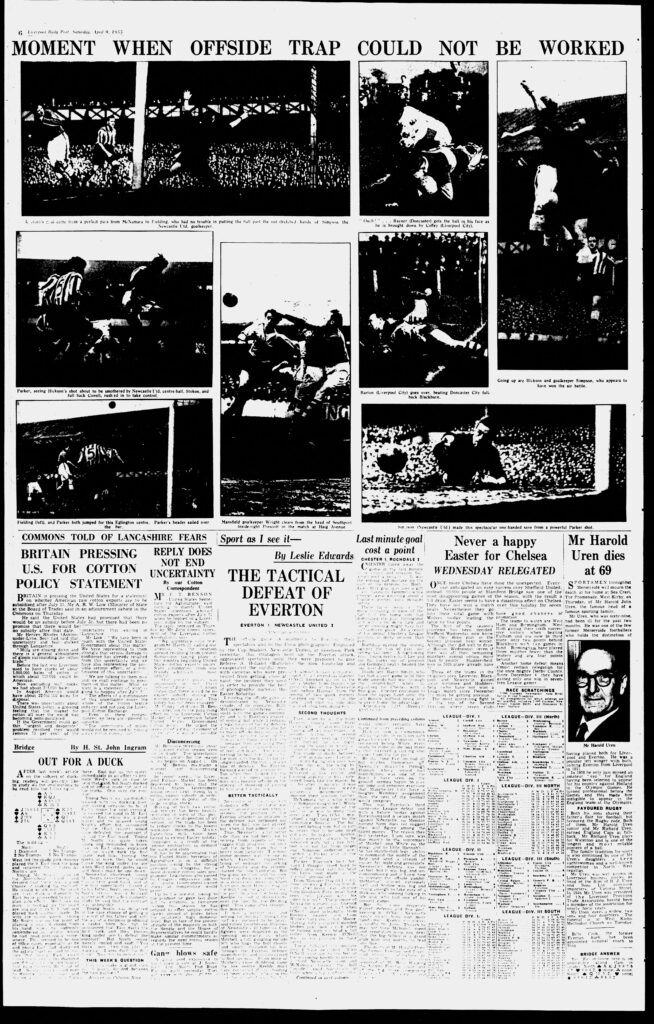
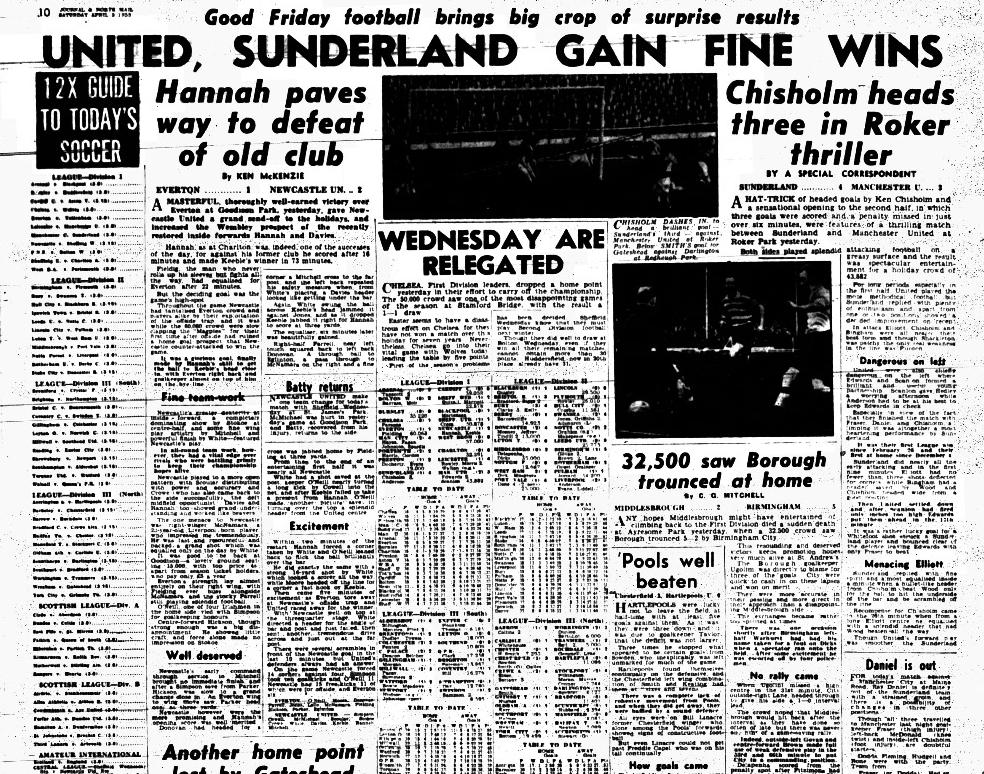
…………………………………………………………………
The Film Maker – Walter Stott
Born in Chorlton-on-Medlock, Manchester, on 14 December 1877, Walter entered the film industry sometime between 1905 and 1910, during the era of silent movies. He began managing cinemas and theatres, and soon made his name in the burgeoning industry. He divided his time and investment between two companies; in partnership with his old school pal Frederick White, he ran the cinemas and film distribution business as ‘The National Film Agency.’ His second concern was the Manchester Producing Company, a film production company set up with an experienced cameraman, Jerry Somers.
Both enterprises continued well into the expanding industry of the ‘talkies.’ He produced films, usually of a commercial nature, for a diverse clientele. Commissions came from factories, shipping companies, the Mersey Docks and Harbour Board, and charity organisations. His first venture into the world of football was quite modest – that of a local football match which was shown at the Rusholme Trocadero in October 1919.
By the 1950s, he was in partnership with a Mr Barrow, and still running the National Film Agency. It was at this stage in 1955 that Stott became involved with Everton Football Club either to make full length films of their First Division home games or to to process the reels.
…………………………………………………………………
Research and layout by Mike Royden
.
.
Acknowledgements
Digital Converters of Ripon – Film digitisation
Lewis Royden (EFCHS) – Film editing
Paul Kelly (EFCHS) & Brendan Connolly (EFCHS) – Sourcing the original film
Richie Gillham (EFCHS) – Arranging the digitisation
Steve Johnson (EFCHS) – Everton Results website
Andrew Weir – Scanning of programme images

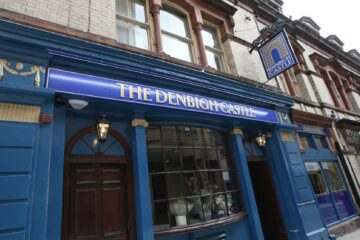


Thanks for putting this up. Watched the film tonight. Great to see the Old Lady looking full (60,068) and to see players like Peter Farrell and Tommy Eglington in action, men I knew from parties at our house in the late 1960’s when I was aged 10. My dad was a professional boxer at the time this match was played and Everton had wanted to sign him in 1948 with Birkenhead contemporaries Jimmy Harris and Ron Saunders, so he knew a number of the Everton players at this time. The match looked a bit laboured to be fair and the state of the pitch can’t have helped. Shame about the result but still a fascinating watch.